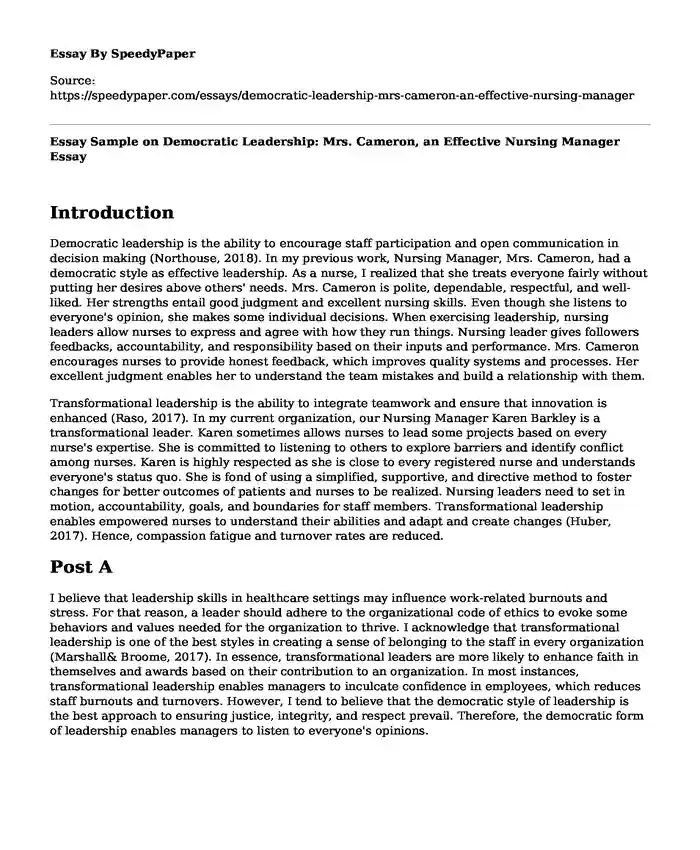
| Type of paper: | Essay |
| Categories: | Nursing Democracy Nursing leadership |
| Pages: | 3 |
| Wordcount: | 641 words |
Introduction
Democratic leadership is the ability to encourage staff participation and open communication in decision making (Northouse, 2018). In my previous work, Nursing Manager, Mrs. Cameron, had a democratic style as effective leadership. As a nurse, I realized that she treats everyone fairly without putting her desires above others' needs. Mrs. Cameron is polite, dependable, respectful, and well-liked. Her strengths entail good judgment and excellent nursing skills. Even though she listens to everyone's opinion, she makes some individual decisions. When exercising leadership, nursing leaders allow nurses to express and agree with how they run things. Nursing leader gives followers feedbacks, accountability, and responsibility based on their inputs and performance. Mrs. Cameron encourages nurses to provide honest feedback, which improves quality systems and processes. Her excellent judgment enables her to understand the team mistakes and build a relationship with them.
Transformational leadership is the ability to integrate teamwork and ensure that innovation is enhanced (Raso, 2017). In my current organization, our Nursing Manager Karen Barkley is a transformational leader. Karen sometimes allows nurses to lead some projects based on every nurse's expertise. She is committed to listening to others to explore barriers and identify conflict among nurses. Karen is highly respected as she is close to every registered nurse and understands everyone's status quo. She is fond of using a simplified, supportive, and directive method to foster changes for better outcomes of patients and nurses to be realized. Nursing leaders need to set in motion, accountability, goals, and boundaries for staff members. Transformational leadership enables empowered nurses to understand their abilities and adapt and create changes (Huber, 2017). Hence, compassion fatigue and turnover rates are reduced.
Post A
I believe that leadership skills in healthcare settings may influence work-related burnouts and stress. For that reason, a leader should adhere to the organizational code of ethics to evoke some behaviors and values needed for the organization to thrive. I acknowledge that transformational leadership is one of the best styles in creating a sense of belonging to the staff in every organization (Marshall& Broome, 2017). In essence, transformational leaders are more likely to enhance faith in themselves and awards based on their contribution to an organization. In most instances, transformational leadership enables managers to inculcate confidence in employees, which reduces staff burnouts and turnovers. However, I tend to believe that the democratic style of leadership is the best approach to ensuring justice, integrity, and respect prevail. Therefore, the democratic form of leadership enables managers to listen to everyone's opinions.
Post B
Ideally, leadership style determines how employees relate and respond to matters of health. In essence, autocratic leadership arises when a leader applies an authoritarian approach to others. I agree that there exists a significant difference between a leader and a manager, which is crucial in an organization. In this context, a manager focuses on making sure the work is done, but a leader tends to provide direction and listen to others' opinions. I think democratic leadership is a practical approach, as members are allowed in the decision-making process. For that reason, every member's advice is appreciated, which are crucial for innovation purposes. Through this kind of leadership, staff will be motivated as their opinions are highly regarded, which leads to the pooling of risks (Zerwekh & Garneau, 2011). Indeed, the democratic approach creates an atmosphere of accountability and ownership, which reduces the turnover rate and, in turn, increases productivity.
References
Huber, D. (2017). Leadership and nursing care management - E-book. Elsevier Health Sciences.
Marshall, E., & Broome, M. (2017). Transformational leadership in nursing: From expert clinician to influential leader (2nd ed.). New York, NY: Springer.
Northouse, P. G. (2018). Leadership: Theory and practice. SAGE Publications.
Raso, R. (2017). Confident leadership. Nursing Management (Springhouse), 48(1), 6. https://doi.org/10.1097/01.numa.0000511188.48913.60
Zerwekh, J. G., & Garneau, A. Z. (2011). Nursing Today: Transition and trends. WB Saunders Company.
Cite this page
Essay Sample on Democratic Leadership: Mrs. Cameron, an Effective Nursing Manager. (2023, Sep 12). Retrieved from https://speedypaper.com/essays/democratic-leadership-mrs-cameron-an-effective-nursing-manager
Request Removal
If you are the original author of this essay and no longer wish to have it published on the SpeedyPaper website, please click below to request its removal:
- Transformational Leadership - Article Review Essay Example
- Essay Example: Personal Leadership Statement for Government PhD Fellowship
- Paper Example. The Quality of Leaders
- Essay Sample on Clinical Nurse Specialty: Women Health
- Free Essay Sample: Leadership Style of Clara Barton
- Free Paper Sample on Business Organization
- Ballots and Patience: A Voter's Journey Through the 2020 Election - Paper Sample
Popular categories




